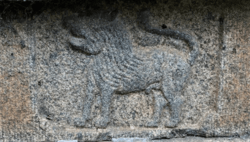Manikandapuram
Manikandapuram (Malayalam: മണികണ്ഠപുരം) was the capital of the Kingdom of Thekkumkur (now part of India)[1]. Manikandapuram is a part of Vakathanam Gramam in the Changanassery Taluk of Kottayam District. At the beginning of the Thekkumkur princely state, the nearest place, Vennimala was established as the headquarters.[2] Vennimala was the most secure place for the enemy. The forests were cut down and developed into habitable areas and the administration is strengthened by the capital city of Manikandapuram.
Manikandapuram മണികണ്ഠപുരം | |
|---|---|
Village | |
 Royal seal of Thekkumkur Dynasty engraved in stone (Punchaman Illom) | |
| Coordinates: 9.518057°N 76.5784076°E | |
| Country | |
| State | Kerala |
| District | Kottayam |
| Government | |
| • Type | Village |
| • Body | Vakathanam Grama Panchayath |
| Time zone | UTC+5:30 (IST) |
| PIN | 686538 |
| Telephone code | 0481 |
| Vehicle registration | KL-33 |
Manikandapuram Temple
.jpg)
The Manikandapuram Sreekrishna Temple was built in the 12th century by Thekkumkur king Eravi Manikanda Varman (reign: 1150 - 1180 C.E). The construction of the temple and the installation of the idol of Lord Krishna took place on the 25th day of Malayalam month Medam (Meṣa) in Kollam Era 325 (1150 C.E).[3][4] The king would take part in the annual festival of Vennimala Sree Rama Lakshmana Swamy Temple. During the royal hunting (Pallivetta) in the temple, the king Eravi Manikandan shot an animal he saw, but it was a cow. The Manikandapuram Temple was built by King Manikandan for his atonement, knowing that he killed a cow.[5][6][7][8]
There is evidence that the fort and the tunnels were at Manikandapuram, as were the later headquarters of the Thekkumkur monarchy at Changanassery and Thaliyanthanapuram (Kottayam)[9]. The temple was very popular in the Thekkumkur dynasty. References to this temple are found in Aithihyamala of Kottarathil Sankunni and Unnuneeli Sandesam, the classics of Malayalam Literature.[10][11]
Unnuneeli Sandesam
The Malayalam poem Unnuneeli Sandesam describes the ancient Manikandapuram and Sreekrishna temple. In this poem, the temple and the underground passages connecting Venimala and Manikandapuram are explicit. There is depression in Manikandapuram, which looks like the entrance to a tunnel. The temple has huge acres of paddy fields in revenue records to feed hundreds of people every day.[12][13]
References
- Book Title: Sthalapurāṇaṅṅaḷ Author: Iṭamaruk Publisher: Royal Book Depot, 1972 Original from The University of California Digitized: 2 Jun 2009 Length: 210 pages
- Book Title: Sthalapurāṇaṅṅaḷ Author: Iṭamaruk Publisher: Royal Book Depot, 1972 Original from The University of California Digitized: 2 Jun 2009 Length: 210 pages
- "MANIKANDAPURAM SREEKRISHNA SWAMY TEMPLE - History". www.manikandapuramtemple.org.
- http://manikandapuramtemple.org/index.php/history/
- R. G. Bhandarkar. Early History of the Dekkan Hardcover – Facsimile, 1 Dec 1996. Asian Educational Services; Facsimile of 1895 ed edition (1 December 1996). pp. Hardcover: 143 pages. ISBN 978-8120601208.
- "MANIKANDAPURAM SREEKRISHNA SWAMY TEMPLE - History". www.manikandapuramtemple.org.
- Kottarathil, Sankunni (2018). AITHIHYAMALA (Malayalam). 1 (Issue No. 1 ed.). Kottayam, Kerala, India: DC Books. p. 20. ISBN 9780195698893
- http://lsgkerala.in/vakathanampanchayat/about/history/
- Encyclopedia of Tourism Resources in India; Author: Dr. Manohar Sajnani, Published in 2001, Published by: Kalpaz Publications; Address: C-30, Satyawati Nagar, Phase-III, Ashok Vihar, Delhi-110052, ISBN 81-7835-014-9 (set), ISBN 81-7835-018-1 (Vol II)
- Kottarathil, Sankunni (2018). Aithihyamala (Malayalam). 1 (Issue No. 1 ed.). Kottayam, Kerala, India: DC Books. p. 20. ISBN 9780195698893.
- Unnuneeli Sandesam - Thembattu Sankaran Nair; Published by DC Books, Kottayam; 132 pages
- Unnuneeli Sandesam - Thembattu Sankaran Nair; Published by DC Books, Kottayam; 132 pages
- Book Title: Unnuneeli Sandesam Edited By: Elamkulam P N Kunjan Pillai Publisher: National Book Stall Category: Malayalam Poems